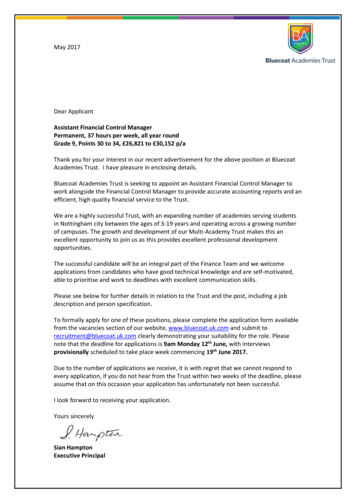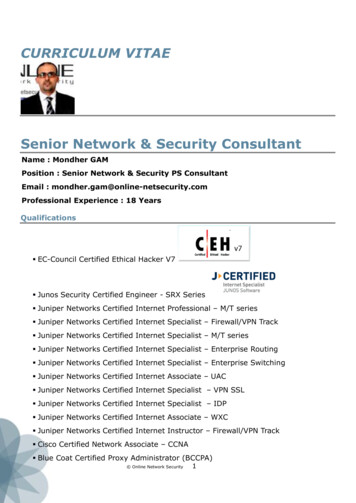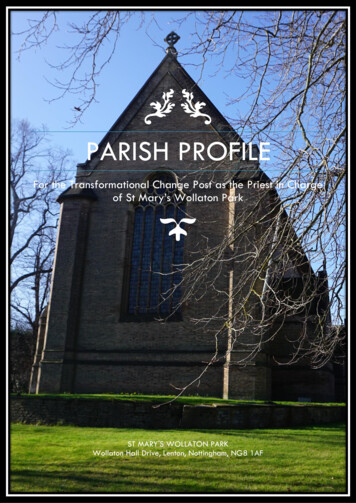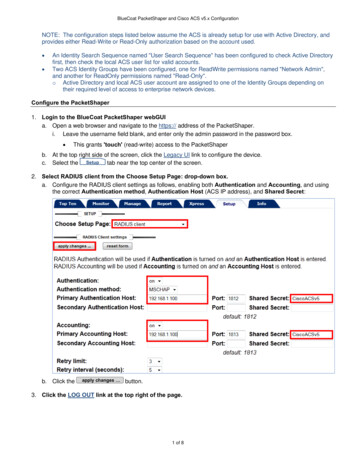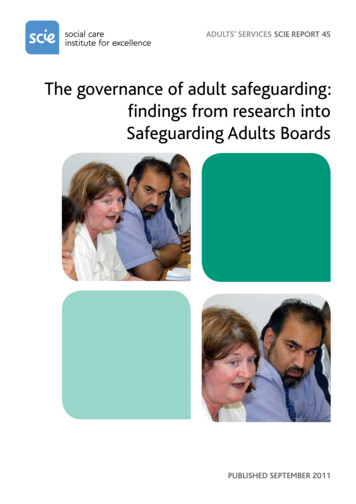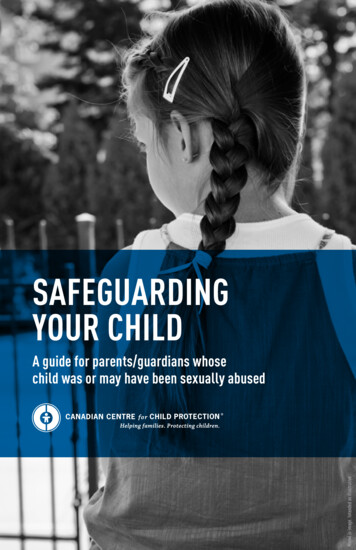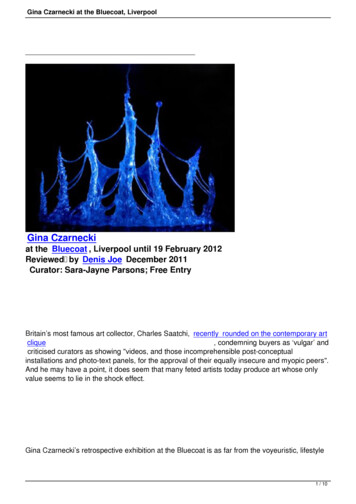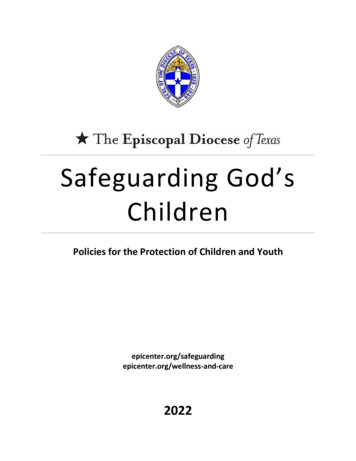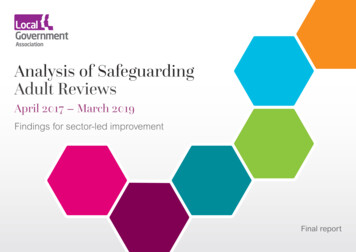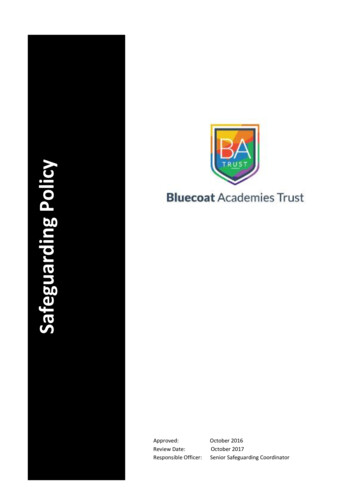
Transcription
Safeguarding PolicyApproved:Review Date:Responsible Officer:October 2016October 2017Senior Safeguarding Coordinator
Child Safeguarding Policy Bluecoat Academies TrustThe policy reflects current legislation, accepted best practice and complies with the governmentguidance: Working Together to Safeguard Children March 2015 and Keeping Children Safe inEducation September 2016Other policies that may need to be taken into account are: Anti-BullyingSex and RelationshipsDrugs EducationBehaviourAttendanceInclusive EducationHealth, Safety and SecuritySafe Recruitment proceduresAcceptable use of ICTMobile Device protocolComplaints procedure Whistleblowing policyStaff Code of ConductThe Context for Safeguarding as outlined by Nottingham CitySafeguarding BoardSchools (including independent schools, non-maintained special schools Academies and freeschools) and Further Education (FE) institutions should give effect to their duty to safeguard andpromote the welfare of their pupils under section 175/157 the Education Act 2002 and whereappropriate under the Children Act 1989 by: creating and maintaining a safe learning environment for children and young people; and, identifying where there are child welfare concerns and taking action to address them, inpartnership with other organisations where appropriate.Governing bodies and proprietors should consider how children may be taught aboutsafeguarding, including online, through teaching and learning opportunities, as part of providinga broad and balanced curriculum. This may include covering relevant issues through personal,social health and economic education (PSHE), and/or-for maintained schools and collegesthrough sex and relationship (SRE).Bluecoat Academies Trust are committed to supporting students in exploring safeguarding issuesas part of the curriculum and Acts of Worship. The Academies Trust will do this within theBluecoat community and also seek external specialist support.
IntroductionAt Bluecoat Academies Trust, the governors and staff fully recognise the contribution theacademies within the Trust make to safeguarding children. We recognise that the safety andprotection of all pupils is of paramount importance and that all staff, including volunteers, havea full and active part to play in providing early help protecting pupils from harm. We believethat each academy within the Trust should provide a caring, positive, safe and stimulatingenvironment, which promotes all pupils’ social, physical, emotional and moral development. Indelivering this ambition we will adhere to the principles set out in Nottingham’s Family SupportStrategy and NCSCB Policy, Procedures and Practice Guidance. (See Appendix 1)We want all children to feel safe, secure and listened to. We endeavour to achieve this throughspecific safeguarding student voice. All students within the Academies Trust have opportunitythroughout the day to speak with staff.Ultimately, effective safeguarding of children can only be achieved by putting children at thecentre of the system, and by every individual and agency playing their full part, working togetherto meet the needs of our most vulnerable children, in line with Working Together 2015 andKeeping Children Safe in Education 2016.The aims of this policy are to: confirm that the pupils’ development is supported in ways that will foster security,confidence and independence raise the awareness of teachers, non-teaching staff and volunteers of the need tosafeguard children and of their responsibilities in identifying and reporting possiblecases of abuse confirm the structured procedures to be followed by all members of the Trustcommunity in cases of suspected harm or abuse emphasise the need for good levels of communication between all members of staffand those with designated responsibility for child safeguarding, health and safety andother safeguarding responsibilities emphasise the importance of maintaining and implementing appropriatesafeguarding policies, procedures and arrangements of those service providers whouse Bluecoat Academies Trust premises to provide any other before, during and afteracademy activities emphasise the links with Bluecoat Academies Trust procedures for safe recruitmentof staff and volunteers, and for managing allegations confirm the working relationship with Children and Families Direct, the NCSCB andother agencies and, where appropriate with similar services in neighbouringauthorities.Responsibilitiesi.The multi academy trust (MAT) governing body:has trained link governor(s) for child safeguardingBA:Rev Jon Hutchinson,BBA:Mrs Viv McCrossenwho will attend training/updates every yearLooked After Children, named:Rev Jon Hutchinson
ii. will ensure a member of the governing body is nominated to liaise with the localauthority and/or partner agencies on issues of child protection in relation tosafeguarding and in the event of allegations of abuse made against the Principal. will ensure that the Trust has a child safeguarding policy, single central record, staffbehaviour policy and procedures in place, operates safe recruitment procedures, makesappropriate checks on staff and volunteers and has procedures for dealing withallegations against staff and volunteers that all comply in accordance with NottinghamCity Safeguarding Children Board. will ensure that the Trust creates a culture of safe recruitment and, as part of that,adopt recruitment procedures that help deter, reject or identify people who might posea risk to children (Part three: Safer Recruitment, Keeping Children Safe in Education2015). has appointed a member of staff of the academies leadership team on each campus andacademy to the role of designated safeguarding lead. This individual is Jo Heffernan(ALC) Claire Bamford (WPC) and Sue Blakeway (BBA) will ensure the Trust keeps an up to date single central record of pre-employmentchecks, specifying when the check was made and when it will be renewed. Monitors the adequacy of resources committed to child safeguarding, and the staff andgovernor training profile recognises that neither it, nor individual governors, have a role in dealing with individualcases or a right to know details of cases (except when exercising their disciplinaryfunctions in respect of allegations against staff) will make sure that the child safeguarding policy is available to parents and children onrequest will ensure this policy and practice complements other policies e.g. anti-bullyingincluding cyber bullying, health and safety, to ensure an integrated model ofsafeguarding operates across the MAT.The Principal will ensure that: the policies and procedures adopted by the MAT Governing Body are followed by allstaff the policy will be updated annually, and be available via the academy’s website. designated staff review policy when the NCSCB update their policies and procedures sufficient resources and time are allocated to enable the designated persons and otherstaff to discharge their responsibilities including taking part in strategy discussions andother multi-agency meetings, to contribute to the assessment and support of childrenand young people, and be appropriately trained a single central database of all staff and volunteers, and their safeguarding trainingdates is maintained and that this list confirms that all staff and those volunteers who meet
the specified criteria have had a DBS check, when this check was made and when it will berenewed all staff and volunteers feel able to raise their concerns about poor and unsafe practicein regard of pupils, and such concerns are addressed in a timely manner in accordancewith agreed policies. MAT staff are sensitive to signs that may indicate possible safeguarding concerns. Thiscould include, for example, poor or irregular attendance, persistent lateness, childrenmissing from education, forced marriage or female genital mutilation. he/she undergoes child safeguarding training which is updated regularly, in line withadvice from the NCSCB.Allegations against the PrincipalWhere an allegation is made against the Principal, the Designated Person for Child Safeguardingmust inform the Chair of the Governing Body, as well as the Local Authority Designated Officer(LADO) 0115 8762302.iii. The trained designated leads (senior managers) for childsafeguarding:1Jo Heffernan (Vice Principal)Aspley Lane Campus0115 9297445 (ex 3005) jheffernan@bluecoat.uk.com2Claire Bamford (Assistant Principal)Wollaton Park Campus0115 9297445 (ex 4333) cbamford@bluecoat.uk.com3Sue Blakeway (Vice Principal)Bluecoat Beechdale Campus0115 9135211 sblakeway@bluecoat.uk.com4Sue-Ellen Shaw (Principal)Bluecoat Academy Primary0115 900 7200 sshaw@bluecoat.uk.com5Melanie Ennis ADSL (Advanced Designated Safeguard Lead for BBA)0115 9135211 mennis@bluecoat.uk.comBluecoat Beechdale Campus5 Victoria Raynor ADSL (Advanced Designated Safeguard Lead for BA)0115 9297445 (Ex 3456) vraynor@bluecoat.uk.com Aspley Lane and Wollaton ParkCampuseswill: be given sufficient time, funding, supervision and support to fulfil their child welfareand safeguarding responsibilities effectively.undergo updated child safeguarding training every two years.Liaise with relevant agencies in accordance with the NCSCB procedures when referring apupil where there are concerns about possible abuse or harmwhere there are concerns about a member of staff’s suitability to work with children,contact the Principal who will refer them to Local Authority Designated Officer (LADO)
be able to access the contents of the NCSCB procedures and Personnel procedures andmake these accessible to all staff ensure all staff, including supply staff, visiting professionals working with pupils acrossthe MAT and volunteers are informed of the names and contact details of thedesignated leads and procedures for safeguarding children support staff who attend strategy meetings, looked after reviews and/or caseconferences support staff and volunteers who may find safeguarding issues upsetting or stressful byenabling them to talk through their anxieties and to seek further support. ensure involvement of other designated leads e.g. where there are concerns about apupil who is ‘looked after’ensure that: written records of concerns are kept, even if there is no immediate need for referral; andmonitored using the Common Assessment Framework (CAF)iv. all child protection records are marked as such and kept securely locked. pupil records are kept separately, and marked as appropriate to indicate otherconfidential records are being held elsewhere where a pupil is subject to a Child Protection Plan, and is absent without explanation fortwo days, their key worker in Children’s Social Care is contacted. records are monitored for patterns of what when taking in isolation would appear to below level concerns and appropriate action is taken where there are existing concerns about a pupil, and they transfer to another school inthis authority, a copy of information held e.g. a CAF is forwarded under confidentialcover and separate from the pupil’s main file to the designated lead for childsafeguarding in the receiving school via hand or recorded delivery. where a pupil has a child protection plan or there are on-going child protection enquiriesand transfers to another school; the designated lead for Safeguarding is informed immediately their child protection file is copied for any new school or college as soon as possible buttransferred separately from the main pupil file and a receipt is obtained from thereceiving School or Academy.The staffAll staff, teaching and non-teaching, volunteers and others working across the MAT need to: be aware that to safeguard children, they have a duty to share information with thedesignated leads, and through the designated lead, with other agenciesbe aware that despite the requirement to share information with designated leads theycan make their own referral to children’s Social Care, e.g. in urgent situations.
be alert to signs and symptoms of harm and abuse. All staff are provided with a copy of‘What to do if you think a child is being abused 2015.know how to respond to their duty when they have concerns or when a pupil disclosesto them and to actknow how to record concerns and what additional information may be required.undergo child safeguarding training which is updated regularly in line with advice fromthe NCSCB, (whole staff training every year)Reporting concerns to the designated leadsAny concern should be discussed in the first instance with one of the designated leads or in theirabsence the head of campus, as soon as possible. If at any point, there is a risk of immediateserious harm to a child, a referral should be made to Children’s Social Care or the policeimmediately. Anybody can make such a referral.Immediate response to the pupilIt is vital that our actions do not harm the pupil further or prejudice further enquiries, forexample: listen to the pupil, if you are shocked by what is being said, try not to showit, it is OK to observe bruises but not to ask a pupil to remove their clothing toobservethem if a disclosure is made,o accept what the pupilsaysostay calm, the pace should be dictated by the pupil without them being pressedfor detail by asking leading questions such as “what did s/he do next?” It is yourrole to listen - not to investigateo use open questions such as “is there anything else you want to tell me?” or“yes?” or “and?”o be careful not to burden the pupil with guilt by asking questions like “why didn’tyoutell me before?”o acknowledge how hard it was for the pupil to tell youo do not criticise the perpetrator, the pupil might have a relationship with themo do not promise confidentiality, reassure the pupil that they have done the rightthing, explain whom you will have to tell (the designated lead) and why; and,depending on the pupil’s age, what the next stage will be. It is important that youavoid making promises that you cannot keep such as “I’ll stay with you all the time”or “it will be all right now”.
Recording information Make some brief notes at the time or immediately afterwards; record theseelectronically including the date, time, place and context of disclosure or concern, factsand not assumption or interpretation. Your name and role should be included. If it is observation of bruising or an injury try to record detail, e.g. “right arm aboveelbow”. Do not take photographs. Note the non-verbal behaviour and the key words in the language used by the pupil(try not to translate into ‘proper terms’). This information is emailed through a safe and secure system on the internalhoneycomb to the safeguarding team at the appropriate campus for follow up.Supporting pupils The staff and governors recognise that a child or young person who is abused orwitnesses violence may find it difficult to develop and maintain a sense of self worth.We recognise that in these circumstances pupils might feel helpless and humiliated, andthat they might feel self blame. Non teaching Year Leaders and a specialisedsafeguarding officer is available throughout the day to appropriately signpost. We recognise that this academy might provide the only stability in the lives of pupilswho have been abused or who are at risk of harm. We accept that research shows that the behaviour of a pupil in these circumstancesmight range from that which is perceived to be normal to aggressive or withdrawn. Each campus of the academy including the primary in the MAT will support all pupilsby: discussing child protection cases with due regard to safeguarding the pupil and his orher family; supporting individuals who are or thought to be in need or at risk in line withNCSCB procedures, encouraging self-esteem and self-assertiveness, challenging and notcondoning aggression, bullying or discriminatory behaviour, promoting a caring, safe andpositive environment. The Academy refers to the Inclusive Education Policy to ensure vulnerable studentswho may need handling or support with intimate care are treated respectfully andconsistently in line with the Inclusive Education Policy Students who receive additional support sometimes through 1:1 working, aresafeguarded through an appropriate working space and pre-arranged timetabledsessions. Any extraordinary support will take place with the knowledge of anothermember of staff. For any overnight stays the Academies Trust will make reference to the Health andSafety Policy.Confidentiality The personal information about all pupils’ families is regarded by those who work inthis MAT as confidential. All staff and volunteers need to be aware of the confidentialnature of personal information and will aim to maintain this confidentiality Staff understand that they need know only enough to prepare them to act withsensitivity to a pupil and to refer concerns appropriately. The designated leads and headof campus will disclose information about a pupil to other members of staff on a need toknow basis only. It is inappropriate to provide all staff with detailed information aboutthe pupil, incidents, the family and the consequent actions.
All Bluecoat staff operate within the information sharing advice document March 2015‘Information sharing is vital to safeguarding and promoting the welfare of children andyoung people. A key factor identified in many serious case reviews has been the failure bypractitioners to record information, to share it, to understand its significance and then takeappropriate action’Staff must be aware that:they cannot promise a pupil complete confidentiality – instead they must explain thatthey may need to pass information to other professionals to help keep the pupil orother pupils safe Where there are concerns about a pupil’s welfare relevant agencies need to beinvolved at an early stage. If a member of staff or a volunteer has concerns about apupil’s welfare, or if a pupil discloses that s/he is suffering abuse or reveals informationthat gives grounds for concern, the member of staff should speak to their designatedperson with a view to passing on the information.Working with parents/carers Parents and carers play an important role in protecting their children from harm. In most cases, each academy in the MAT will discuss concerns about a pupil with thefamily and, where appropriate, seek their agreement to making referrals to Children andFamilies Direct. Information will shared through regular MAT team safeguarding meetings. Where there are any doubts, the designated lead should clarify with Childrenand Families Direct whether, and if so when and by whom, the parents should betold about the referral. The pupil’s views will be considered in deciding whether to inform the family,particularly where the pupil is sufficiently mature to make informed judgments aboutthe issues, and about consenting to that. The MAT aims to help parents understand that we have a duty to safeguard andpromote the welfare of all pupils and may need to share information and work inpartnership with other agencies when there are concerns about a pupil’s welfare.Professional development The MAT governors recognise that all staff and volunteers who work with pupils agedup to 18 years need to have appropriate child safeguarding training that equips them torecognise and respond to pupil welfare concerns. We will ensure staff are given mandatory induction, which includes familiarisation withchild safeguarding policy, staff behaviour policy, the Designated leads in the individualacademies, their responsibilities and procedures to be followed. A training register is kept to indicate when staff and governors have been trained andthis in turn informs the annual report to governors.
Appendix 1Working Together To Safeguard Children 2015 & Keeping Children Safe in Education 2016Statutory duties that apply to schools and academiesSchools and Academies should have in place arrangements that reflect the importance ofsafeguarding and promoting the welfare of children, including: ensuring that the school, Academy or college contributes to inter-agency working in linewith statutory guidance Working Together to Safeguard Children 2015. This includesproviding a co-ordinated offer of early help when additional needs of children areidentified and contributing to inter-agency plans to provide additional support to, forexample, children subject to child protection plans and children looked after.a clear line of accountability for the commissioning and/or provision of services designedto safeguard and promote the welfare of children;a senior member of staff to take leadership responsibility for the school’s safeguardingarrangements;a culture of listening to children and taking account of their wishes and feelings andensuring there are systems in place for children to express their views and give feedback;ensuring there are procedures in place to handle allegations including those relating tochildren harming, or allegedly harming other children;arrangements which set out clearly the processes for sharing information, with otherprofessionals and with the Local Safeguarding Children Board (LSCB);a designated professional lead for safeguarding. Their role is to support other membersof staff, to recognise the needs of children, including recognising and responding topossible abuse or neglect. Designated leads’ roles should always be explicitly defined injob descriptions. They should be given sufficient time, funding, supervision and supportto fulfil their child welfare and safeguarding responsibilities effectively;safe recruitment practices for individuals whom the organisation will permit to workregularly with children including policies on when to obtain a relevant Disclosure, andBarring Scheme (DBS) check.Schools, academies and colleges must keep a single central record of DBS checks andtraining undertaken. The record must cover the following people:o all staff (including supply staff) who work in the school; in colleges, this meansthose providing education to childreno all others who work in regular contact with children in the school or college,including volunteerso for independent schools, including academies and free schools, all members ofthe proprietor body.it is the school’s responsibility to ensure that all the staff they employ in specified early orlater years childcare have had the appropriate checks. This includes ensuring that staffworking in early and later years settings are suitable to do so. The DfE issued new advicefor schools in October 2014, in relation to the ‘disqualification by association’ of teachersand other school staff working in early or later years provision, or those who are directlyconcerned with the management of such provision. A person is automatically disqualifiedif they live in the same household as another person who is disqualified or in a household
where a disqualified person is employed. The categories of staff in nursery, primary orsecondary school settings covered by regulation13 include staff who:o work in the early years provision (including teaching staff and support staffworking in school nursery and reception classes)o work in later years provision for children who have not reached the age of eight,including before-school settings such as breakfast clubs and after- schoolprovisiono are directly concerned with the management of such early or later yearsprovision. employers are responsible for ensuring that their staff are competent to carry out theirresponsibilities for safeguarding and promoting the welfare of children and creating anenvironment where staff feel able to raise concerns and feel supported in theirsafeguarding role;staff should be given a mandatory induction, which includes familiarisation withsafeguarding responsibilities and procedures to be followed if anyone has any concernsabout a child’s safety or welfare. Staff in schools and colleges should ensure that all staffread at least part one of Keeping Children Safe in Education 2016. There should then bean ongoing programme of refresher training.Ensure there is an effective child safeguarding policy in place together with a staffbehaviour policy (code of conduct).Both should be provided to all staff-includingtemporary staff and volunteers- on induction;all professionals should have regular reviews of their own practice to ensure theyimprove over time.the designated lead professional for safeguarding should maintain comprehensiverecords.All schools and colleges have to be compliant with the requirements of the LSCB, inNottingham this includes engagement in the Serious Case Review process.The NCSCB requires all schools to complete an annual safeguarding auditEngagement in multi-agency processes and Serious Case Reviews (See Working Together2015, to be read in conjunction with DfE KCSIE 2016) Clear policies in line with thosefrom the LSCB for dealing with allegations against people who work with children, ineither a paid or voluntary capacity. An allegation may relate to a person who works withchildren who has:obehaved in a way that has harmed a child, or may have harmed a child;opossibly committed a criminal offence against or related to a child; orobehaved towards a child or children in a way that indicates they may pose a riskofharm to childrenIn addition:The Local Authority Designated Officer (LADO) (contact: 0115 876 4800) is to be involved in themanagement and oversight of individual cases where there are allegations made against peoplewho work with children. The LADO should provide advice and guidance to schools, liaising withthe police and other agencies and monitoring the progress of cases to ensure that they are dealtwith as quickly as possible, consistent with a thorough and fair process;
any allegation should be reported immediately to a senior manager within the school.The LADO should also be informed within one working day of all allegations that come toan employer’s attention or that are made directly to the police; and if an organisation removes an individual (paid worker or unpaid volunteer) from worksuch as looking after children (or would have, had the person not left first) because of aconcern that the person may pose a risk of harm to children, the organisation must makea referral to the Disclosure and Barring Service. It is an offence to fail to make a referralwithout good reason.In addition to these duties, which apply to schools, further safeguarding duties are also placedon them through other statutes. The key duties that fall on schools are set out below.Schools, academies and collegesSection 175 of the Education Act 2002 places a duty on local authorities (in relation to theireducation functions and governing bodies of maintained schools and further educationinstitutions, which include sixth-form colleges) to exercise their functions with a view tosafeguarding and promoting the welfare of children who are pupils at a school, or who arestudents under 18 years of age attending further education institutions. The same duty applies toindependent schools (which include Academies and free schools) by virtue of regulations madeunder section 157 of the same Act.In order to fulfill their duty under sections 157 and 175 of the Education Act 2002, all educationalsettings to whom the duty applies should have in place the arrangements as set out above. Inaddition schools should have regard to specific guidance given by the Secretary of State undersections 157 and 175 of the Education Act 2002 namely Safeguarding Children and SaferRecruitment in Education and Dealing with allegations of abuse against teachers and other staff.
Appendix 2Mandatory ReportingFemale Genital Mutilation (FGM),also known as female genital cutting and female circumcision, is the ritual removal of some orall of the external female genitalia. Typically carried out by a traditional circumciser using ablade, with or without anaesthesia.FGM is concentrated in 27 African countries, Indonesia, Yemen and Iraqi Kurdistan, and foundelsewhere in Asia, the Middle East and among diaspora communities around the world. It isconducted from days after birth to puberty and beyond. In half the countries for which nationalfigures are available, most girls are cut before the age of five.Since October 2015, it is the statutory duty of all staff to report cases and concerns surroundingFGM. At Bluecoat Multi Academy Trust we put through our concerns using the normalsafeguarding channels. Designated Safeguarding Lead teachers will then report to the police(within 21 days).All ‘at risk’ student groups are tracked via their attendance and unauthorisedholidays. For the full Home Office Guidance follow the link the further ads/system/uploads/attachment data/file/496415/6 1639 HO SP FGM mandatory reporting Fact sheet Web.pdfPrivate FosteringThe legislation governing private fostering is the ‘Children (Private Arrangements for Fostering)Regulations 2005’ and came into force following the death of Victoria Climbie in 2000. Victoria wasprivately fostered by her great aunt.Given the ‘hidden’ nature of much private fostering, local authorities have a duty to raise awarenessof the need to notify the local Children’s Services departmentThe Children Act 1989 Section 66 defines a 'privately fostered child' as:A child who is under 16 years, or 18 if disabled, who is cared for and provided with accommodationin their own home by someone other than:a. His or her parent;b. Another person who is not his or her parent but who has Parental Responsibility for him or her;A child's relative - defined by the Children Act 1989 Section 105(1) as a grandparent, brother, sister,uncle or aunt (whether of full or half blood or by affinity (marriage) or civil partnership), or stepparent.
Appendix 3Signs and Symptoms of Abuse and NeglectWhat is abuse and neglect?Abuse and neglect are forms of maltreatment of a
0115 9297445 (ex 3005) jheffernan@bluecoat.uk.com 2 Claire Bamford (Assistant Principal) Wollaton Park Campus 0115 9297445 (ex 4333) cbamford@bluecoat.uk.com 3 Sue Blakeway (Vice Principal) Bluecoat Beechdale Campus 0115 9135211 sblakeway@bluecoat.uk.com 4 Sue-Ellen Shaw (Principal) Bluecoat Academy Primary
